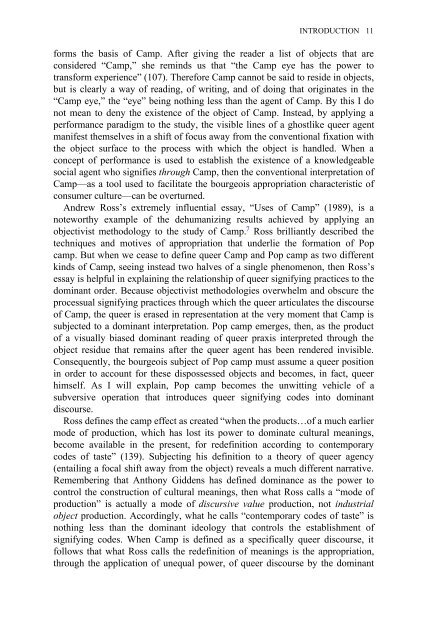Edited by Moe Meyer - Get a Free Blog
Edited by Moe Meyer - Get a Free Blog
Edited by Moe Meyer - Get a Free Blog
You also want an ePaper? Increase the reach of your titles
YUMPU automatically turns print PDFs into web optimized ePapers that Google loves.
INTRODUCTION 11<br />
forms the basis of Camp. After giving the reader a list of objects that are<br />
considered “Camp,” she reminds us that “the Camp eye has the power to<br />
transform experience” (107). Therefore Camp cannot be said to reside in objects,<br />
but is clearly a way of reading, of writing, and of doing that originates in the<br />
“Camp eye,” the “eye” being nothing less than the agent of Camp. By this I do<br />
not mean to deny the existence of the object of Camp. Instead, <strong>by</strong> applying a<br />
performance paradigm to the study, the visible lines of a ghostlike queer agent<br />
manifest themselves in a shift of focus away from the conventional fixation with<br />
the object surface to the process with which the object is handled. When a<br />
concept of performance is used to establish the existence of a knowledgeable<br />
social agent who signifies through Camp, then the conventional interpretation of<br />
Camp—as a tool used to facilitate the bourgeois appropriation characteristic of<br />
consumer culture—can be overturned.<br />
Andrew Ross’s extremely influential essay, “Uses of Camp” (1989), is a<br />
noteworthy example of the dehumanizing results achieved <strong>by</strong> applying an<br />
objectivist methodology to the study of Camp. 7 Ross brilliantly described the<br />
techniques and motives of appropriation that underlie the formation of Pop<br />
camp. But when we cease to define queer Camp and Pop camp as two different<br />
kinds of Camp, seeing instead two halves of a single phenomenon, then Ross’s<br />
essay is helpful in explaining the relationship of queer signifying practices to the<br />
dominant order. Because objectivist methodologies overwhelm and obscure the<br />
processual signifying practices through which the queer articulates the discourse<br />
of Camp, the queer is erased in representation at the very moment that Camp is<br />
subjected to a dominant interpretation. Pop camp emerges, then, as the product<br />
of a visually biased dominant reading of queer praxis interpreted through the<br />
object residue that remains after the queer agent has been rendered invisible.<br />
Consequently, the bourgeois subject of Pop camp must assume a queer position<br />
in order to account for these dispossessed objects and becomes, in fact, queer<br />
himself. As I will explain, Pop camp becomes the unwitting vehicle of a<br />
subversive operation that introduces queer signifying codes into dominant<br />
discourse.<br />
Ross defines the camp effect as created “when the products…of a much earlier<br />
mode of production, which has lost its power to dominate cultural meanings,<br />
become available in the present, for redefinition according to contemporary<br />
codes of taste” (139). Subjecting his definition to a theory of queer agency<br />
(entailing a focal shift away from the object) reveals a much different narrative.<br />
Remembering that Anthony Giddens has defined dominance as the power to<br />
control the construction of cultural meanings, then what Ross calls a “mode of<br />
production” is actually a mode of discursive value production, not industrial<br />
object production. Accordingly, what he calls “contemporary codes of taste” is<br />
nothing less than the dominant ideology that controls the establishment of<br />
signifying codes. When Camp is defined as a specifically queer discourse, it<br />
follows that what Ross calls the redefinition of meanings is the appropriation,<br />
through the application of unequal power, of queer discourse <strong>by</strong> the dominant


